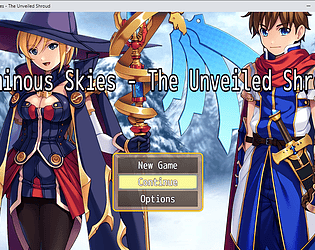Alright, update time for this game. First time that I've done one of these on this site, so here it goes...
I've added two books to the game. One of them is the Privateer's Handbook, which has a brief history on the Royal Privateers and how they are to conduct themselves out in the field.
The second book is a study on the Werminn of Frostwind and an overview on their culture.
The reason for these items is to give players some additional background without bogging them down with 5 hours of cutscenes with no gameplay in sight. These two books seemed to be the best that I could make for the setting without completely branching off into some tangent that wasn't plot relevant. Lore and backstory are important and all but it has to be there in service to the plot. An example of something not plot relevant would be to give the player a history of Thorn Creek (the player would gain nothing by reading about it). It should be noted that the books cannot be taken at face value as things are omitted or lost with the passage of time.
Adjusted the dialogue with the little girl at the Imperial Outpost. Originally, this was added at the last minute and it was just meant to be slightly egging on the foreshadowing of future events. I've now adjusted it to double down on it (depending on the outcome)... if you watched Fullmetal Alchemist or seen the memes, you know.
Revised the intro sequence so that it, hopefully offers a better explanation, of what's going on while still keeping it relatively trim. Remember, my inspirations are games like Diablo and Phantasy Star Online. If you haven't played either of them, both of these games were succinct in terms of their story telling (often keeping their backstory in the form of journal entries). There were a total of 4-5 lines of relevant plot information before the player is dungeon crawling in the original Diablo. While Blizzard prided themselves on having fancy cinematics, there was a beauty in this simplicity. PSO had a 3 min opening cinematic and not more that a few minutes of in-game exposition before the player embarks on their quest. Phantasy Star 4 also kept things relatively trim.
Player character development was not really on the table for this one. I had neither the inclination or desire but maybe I can do a character development arc in another project.
I decided against major adjustments to the combat, this is probably a mistake. But it's a lot of work (on the order of months and years to get right) for just a quick module that was using MZ's base system. Although I probably should go back and at least make some skill adjustments to make the enemies on higher difficulties more threatening (since it was noted that combat was too easy; honestly, a first). On the plus side, it does offer a rudimentary enemy database, which is sorely lacking by default with MZ. I might skip on combat entirely for future game jam projects, unless it is core to the theme.
Thought about adjusting the loot drops and the like but after seeing the stat bonuses on the weapons, the advantage is marginal, at best. Also, more work that it's worth for a game jam project.
I've also realized that having a deadline is great, it sets expectations and goals. Setting an arbitrary deadline of two weeks for a story creates a first draft, not a complete work.
I had written down more but I cut out parts of it. It was just me meandering into other thoughts I had. I could always flesh it out and post it later.
Added the ability to play blackjack against the innkeeper, in the werminn camp. No reason for doing this, I just thought it'd be fun.
Hopefully, whoever is reading this finds it at least informative as to why the adjustments that were made.
I hope that you have a great day.



